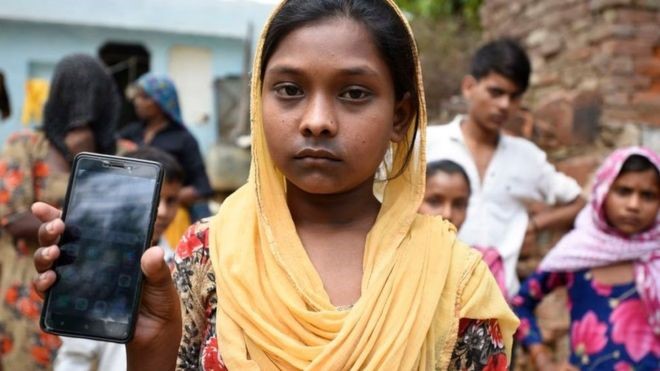Neither mobile nor internet – how to study in online class
How many children in India have a smartphone or laptop to study? This is a question that the Government of India does not yet have the answer to.
The National Council of Educational Research and Training (NCRT) reported on 19 August that 18 states and union territories are still trying to know how many percent of children in India can access any digital medium such as TV, radio, internet based devices. , Is not even mobile and landline.
Survey shows that poor internet, lack of electricity and lack of smartphones or laptops is driving children away from studies.
Out of 24 crore learners in India, this survey conducted on 18,188 children also revealed that about 80 percent of the children do not have laptops. And about 20 percent of the children do not have a smartphone.
What is behind the data?
Now the question is, do these figures fully represent the real situation?
According to the NCRT, more than 27 percent of children, teachers and householders in India are struggling with the lack of smartphone devices in the process of taking online classes.
Recently, a girl from West Bengal ended her life simply because she was not able to take an online class due to allegedly not having a smartphone.
In Assam too, a 15-year-old child commits suicide for allegedly failing to attend an online class, and a Tripura father allegedly commits suicide due to not being able to give his child a single smartphone.
However, these are not figures, but some painful stories of human compulsion and ‘dream breakdown’ that do not appear that way in the mainstream.
Experts are of the opinion that India is a country where there is only one way to get out of caste, religion and social abyss, that is education.
People living in this ‘abyssal’ raise their children by telling them that such and such person used to ride a rickshaw but his daughter has become an IAS officer or a girl has become a senior officer while breaking caste boundaries.
The goal behind these things is that the Indian parents, if their children are studying, they will not have to bear all that they have suffered because of their distance from education.
Right to education became limited
But after the lockdown on March 21, a large section of India’s children immediately reached the time when only a certain class of children had the right to education.
In this era of online education due to compulsion, the ‘right to education’ is limited to only those possessing smartphones or laptop devices and those who do not have digital devices, are disappearing from the online schools.
When Virendra Kumar, father of Sambrant, who lives in Sitapur, Uttar Pradesh, came to know that his son would have to study with text messages and WhatsApp etc. for the next few days, he felt that this method would not work.
But he did not let his opinion become an obstacle in the child’s education.
He says, “If I wanted to know my opinion, I knew from day one that it would not work. And didn’t even. But for the sake of elite, we tried to teach him by coming to the farm in the afternoon. Because internet speed does not come at home. He tried a lot But what is possible without internet signal. Where we live, it is a forest area and the Internet is very difficult to find here. “
Virendra, who was telling the area of the forest, is actually just 88 km from Lucknow, the capital of Uttar Pradesh.
Currently Sambrant has left school and his father Virendra has spent five to six thousand rupees and brought stationery items and science-geography books for him.
Virendra says, “I brought books so that the (elite) mind of it …”
Increasing economic inequality day by day
If we talk about the technology of online education, then online education requires a good quality phone, better battery, memory space and internet connection.
According to ICAI, out of India’s 130 crore population, around 45 crore people have smartphones.
This means that more than half the population are without smartphones. Sometimes, there is only one smartphone in a family of five to six people. In such a situation, if there are two children in a house who have to study online from morning to afternoon, then they need two phones.
In such a situation, it is a challenge to arrange a new phone for those families whose income is low or has been stopped in lockdown.
Suppose that the head of the family has also collected two smartphones, then there will be a problem of data in front of him.
A zoom class usually requires one and a half to two Mbps speed. And one hour class costs 1.5 to 2 GB of data.
For immediate internet use, the family will have to take two SIM or broadband internet connection, which will have to be borne between the reduced salary and increased expenses.
After this, when two children of this family have to take six classes a day and 144 classes a month, then more than 216 GB per month of data will be required per child.
In such a situation, if the cost of data per GB is fixed at 20 rupees, then the additional cost in a month per child comes to 4500 rupees.
In this way, the additional expenditure of 9000 rupees per month in a family of two children will only be for the Internet.
Now let’s talk, how will rural and urban India bear this extra expense.
India’s per capita income is about 17 thousand rupees.
But this is average income. There is a huge disparity in per capita income between rural India and urban India.
Infringement of fundamental rights
According to World Bank data, more than 26 crore people in India live below the poverty line, who earn less than 200 rupees per day.
And majority of the population earning less than 200 rupees per day is dependent on agriculture and due to seasonal events, they suffer economic losses every year.
In such a situation, the question arises that if a person earning six thousand per month will spend an additional 9 thousand rupees every month on the internet, what will he eat?
Virendra Kumar also belongs to this economic group. In the beginning of the year, it was very difficult for Virendra, who lost his crop due to hailstorm and heavy rain.
But in spite of all this, his spending of five to six thousand rupees on the education of the elite shows that he does not want the mind of the elite to be lost forever from studies.
Expert Ambarish Rai, who knows the right to education law, believes that there is no longer a situation in India where education is not aware of education.
He says, “The householders are alert, that’s why they are making every effort to teach their children.” Home animals are being sold so that they can take a smartphone and give it to the child. In such a situation, the parents are no longer responsible. Rather now the government has to ensure that every child of the country can use his right to education. “
“Whatever path the government takes in this way, it has to keep in mind that education is a fundamental right. There is a law in the country. And due to the policies of the government, no child’s right to education should be violated. It is the responsibility of the government to look after and protect the deprived sections. The government is not for the prevalved, but for the under-praised. Gandhiji used to talk of wiping the last eye tears. This is the responsibility of the government. “
Breaking dreams and growing gap
But when the government, after knowing everything, says that “Luckily everyone has a mobile” and with their help, education can be given, then the question arises as to which government and whose fortunes the government is talking about.
Educationist Anita Rampal believes that it is quite insensitive to think that in an economically unequal country like India, education can be imparted through the Internet on devices like smartphones and laptops.
Anita says, “Students in India are already experiencing unprecedented levels of anxiety because of this terrible epidemic. Somewhere a job has gone, some one has lost his life. Or people are ill. And many families are also facing lack of drinking. At such a time, to put a worry on them that they are not able to attend class… it is necessary to think that what mental effect will this have on the children? ”
The NCERT has written in a message issued to the principals that students who do not have a smartphone can be given directions through MMS.
About children facing the pressure of completing syllabus at the same time, Anita says, “This is a very cruel system which thinks that syllabus can be covered through online education.” Syllabus is not a cover item. Syllabus has to be discovered. Yashpal ji wrote in his report long ago that there is a need to discover the content of syllabus. “
“To isolate someone and say that his education is being done, it is a violation of that student’s fundamental right.” If you look at Chapter 5 of the Right to Education law, then it is known that what kind of education he talks about. Understanding is made from activities, coz and discussion among themselves. It is not education to sit in front of a screen and stare at it. “
It is said that it is more dangerous to take away everything from him than to take away the hope of getting everything back from him.
The education system so far, despite all its shortcomings, gives hope to even the most deprived section of the society to sit on the highest chair of the country. The APG Abdul Kalam, known as the former president and missile man, is the biggest example of this.
Now the election has to be done by the government that she would like to keep alive the hope of becoming a child in any other child, or because of not having a smartphone in the name of online education, she will be seen to be strangling her hope out of the race. The government has to decide.




